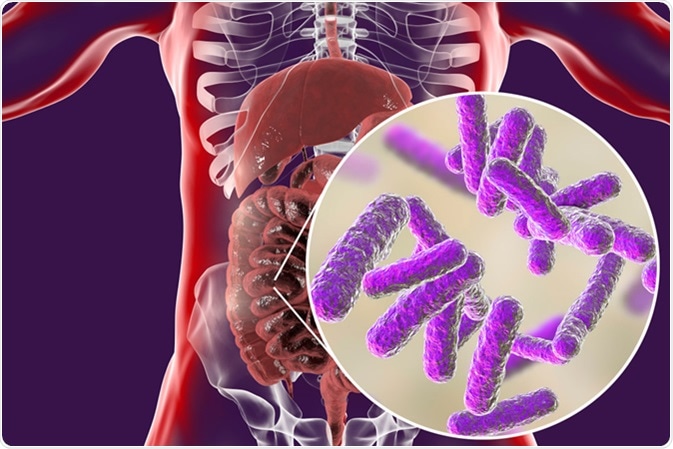According to the scientific literature, drinking coffee is beneficial for the gut health. It helps improve bowel movement by increasing the motility of smooth muscle in the gastrointestinal tract.

Image Credit: ImYanis / Shutterstock
How do gut microbiota affects normal physiological functions?
There has been an ample of evidence claiming that drinking coffee can improve the gut microbiome and maintain metabolism. In human body, about 10 trillion microorganisms including bacteria, viruses, fungi, and protozoa and 1,000 microbial strains are present in the gastrointestinal (GI) tract.

Intestinal microbiome, anatomy of human digestive system, 3D illustration. Image Credit: Kateryna Kon / Shutterstock
The entire population of GI microorganisms is collectively known as the gut microbiota. In normal physiological condition, the gut microbiota plays important roles in regulating a wide variety of cellular functions, including energy metabolism, immune response, and neuroendocrine response.
A growing pool of evidence suggests that any alteration in the GI microbiome content (dysbiosis) can lead to serious health complications, such as non-alcoholic fatty liver disease, non-alcoholic steatohepatitis, inflammatory bowel disease, cardiovascular disease, diabetes mellitus, obesity, and cancer.
The gut microbiota facilitates the absorption of food nutrients, synthesis of enzymes, and production of short-chain fatty acids (SCFAs). The types and quantity of SCFA produced by the gut microbiota determine the overall functional outcome of many physiological processes through the modulation of anti-inflammatory and neuroendocrine responses.
How coffee affects gut health?
Coffee is one of the most commonly consumed beverages globally. It comprises more than 1500 active ingredients, such as caffeine, minerals, phenolic polymers, polysaccharides, and chlorogenic acid.
Several studies have claimed that consumption of coffee helps improve the bowel movement. As a postoperative care for constipation, coffee intake has been shown to significantly reduce the time to first bowel movement, first flatus, and solid diet tolerance.
It has also been shown that mannooligosaccharides extracted from spent coffee grounds can stimulate the growth of beneficial gut bacteria and increase the production of SCFAs. However, spent coffee grounds also contain 5-(hydroxymethyl) furfural, furfural, and poly phenols, which may inhibit beneficial gut microorganisms and prevent the beneficial effects of mannoligosaccharides.
A recent study on rats has shown that consumption of coffee for three days causes an increase in the rate of smooth muscle contraction in the small intestine and colon. Moreover, coffee intake suppresses the growth of bacteria and other microorganisms in the fecal matter in a dose-dependent manner. However, further studies are needed to evaluate whether the changes in bacterial content in the fecal matter is favorable for the beneficial bacteria or harmful bacteria.
Most interestingly, the study has found that the observed effects of regular coffee on gut function and gut microbiota are similar to the effects caused by consumption of caffeine-free coffee. This indicates that caffeine is not the causative ingredient in coffee responsible for the aforementioned benefits.
In contrast to the studies claiming gut benefits of coffee, there is evidence showing that consumption of coffee does not improve the altered profile of gram-positive and gram-negative bacteria in mice with metabolic syndrome. However, coffee intake has been shown to reduce the risk of several metabolic disorders.
Moreover, two major ingredients of coffee, caffeine and chlorogenic acid, have been shown to reverse liver pathology in obese, diabetic mice without altering the obese status.
Although coffee intake fails to repair the gut dysbiosis, the study has found that coffee intake for 16 weeks significantly changes the percentage of certain bacteria, including Blautia, Coprococcus, and Prevotella.
In addition, both caffeine and chlorogenic acid have been shown to partially restore the plasma level of SCFAs. These effects of coffee ingredients may be attributed to improved liver inflammation in mice with metabolic syndrome.
Further Reading
Last Updated: Feb 10, 2020